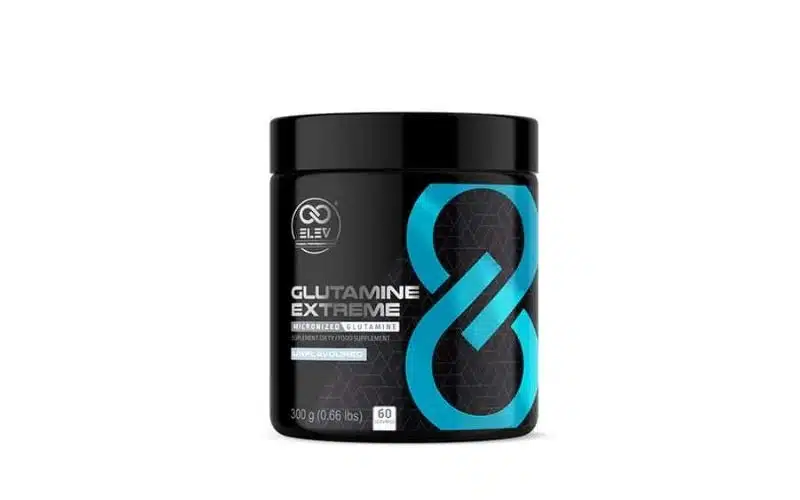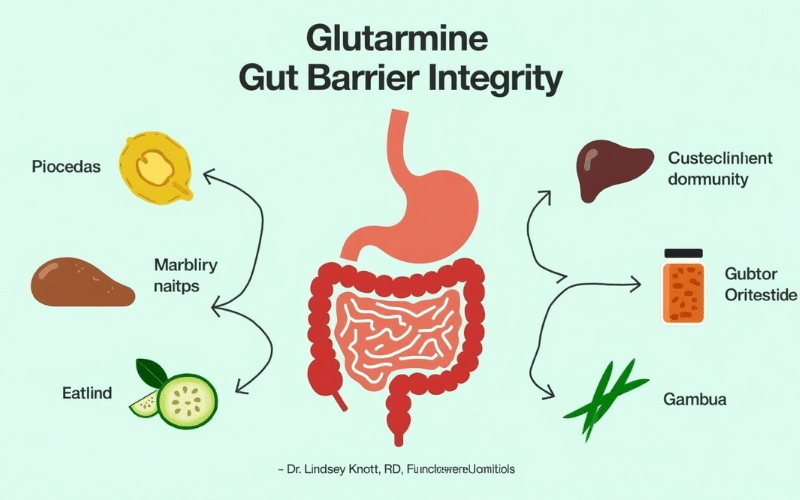No products in the cart.
Return To ShopBenefits of Glutamine: A Complete 2025 Guide
Glutamine is a conditionally essential amino acid, meaning your body typically produces enough of it on its own, but during times of stress, illness, or intense physical exertion, external sources may be needed. It plays a key role in protein synthesis, immune regulation, and gut integrity. Glutamine is the most abundant free amino acid in the human body and serves as a fuel source for rapidly dividing cells such as those in your intestines and immune system.
Types of Glutamine: L‑Glutamine vs D‑Glutamine
There are two forms of glutamine: L‑glutamine and D‑glutamine. The form used in the human body is L-glutamine, which is commonly found in food and supplements. D-glutamine, on the other hand, has no known biological use in humans. When you purchase glutamine supplements, you are almost always getting L-glutamine.

Top Health Benefits of Glutamine
Top Health Benefits of Glutamine: Supports gut health, boosts immunity, aids muscle recovery, and promotes faster healing.
Enhancing Immune Function
Glutamine is critical for immune cell proliferation. It fuels white blood cells such as lymphocytes and macrophages, especially during infections or recovery from surgery. A 2022 review in Clinical Nutrition found that glutamine supplementation reduced infection rates in critically ill patients.
Supporting Gut Barrier & Digestive Health
One of glutamine’s most celebrated roles is maintaining intestinal permeability and gut lining health. It nourishes enterocytes (intestinal cells), helping to reduce symptoms of IBS, leaky gut, and inflammatory bowel disease (IBD).Glutamine acts as a primary energy source for gut mucosa, potentially improving symptoms in IBS patients.
Muscle Recovery & Reduced Soreness
Glutamine is often used by athletes to support muscle repair after workouts. It may help reduce muscle soreness and catabolism post-exercise. Though not a direct muscle builder like BCAAs, a 2021 meta-analysis in the Journal of Sports Medicine reported modest improvements in muscle recovery and soreness reduction among athletes using glutamine.
Wound Healing & Tissue Repair
Glutamine aids in cell proliferation and collagen formation, making it valuable in post-surgical healing and burn recovery. Studies have shown that patients given glutamine-enriched nutrition after surgery recovered faster and had fewer complications.
Cognitive and Brain Health Benefits
Emerging evidence suggests glutamine may help regulate neurotransmitters like GABA and glutamate, both essential for brain function and mood. Anecdotal use has linked it to reduced “brain fog” and improved mental clarity during recovery periods or calorie restriction, though more clinical evidence is needed.
Cardiovascular Support
While not a primary cardiovascular supplement, glutamine’s anti-inflammatory effects may indirectly support heart health by reducing oxidative stress and arterial inflammation. Some studies suggest improved endothelial function in patients supplemented with glutamine post-surgery.
Food Sources of Glutamine
While supplements offer concentrated doses, glutamine is also found in many protein-rich foods:
- Chicken, beef, turkey
- Eggs and dairy (e.g., yogurt, cheese)
- Tofu and legumes
- Spinach and cabbage
Cooking may reduce glutamine content slightly, but a balanced diet rich in protein generally provides sufficient amounts under normal conditions.
Recommended Dosage & Timing
For general health and support, 5 grams per day is a typical starting dose. In clinical or sports settings, doses may range from 10 to 30 grams daily, divided into 2–3 servings.
- Post-workout: Aids recovery and muscle repair
- Before bed: Supports tissue regeneration overnight
- Empty stomach: Best absorbed when not competing with other amino acids
Always consult a healthcare provider before starting high-dose supplementation.
Who May Benefit Most from Glutamine?

- Athletes and bodybuilders – for recovery and immune resilience
- IBS or IBD patients – for gut lining support
- Post-surgical patients – for wound healing
- People under chronic stress – to reduce immune suppression
- Vegans with low dietary protein intake – may benefit from supplements
Possible Side Effects & Safety Considerations
Glutamine is generally well tolerated, but high doses (>30g/day) may cause:
- Bloating or stomach discomfort
- Headache or dizziness (rare)
- Risk of ammonia buildup in people with liver disease
- Caution is advised during pregnancy, breastfeeding, and for those on anti-epileptic or psychiatric medications
Always consult your doctor if you have underlying health conditions.
Expert Insights & Testimonials
“Glutamine plays a vital role in gut barrier integrity, which is crucial not just for digestion but for immunity too. I recommend it for patients with IBS or after antibiotic use.”
Dr. Lindsey Knott, RD, Functional Nutritionist

Contraindications and Interactions
Avoid glutamine supplements if:
- You have liver cirrhosis or hepatic encephalopathy
- You are on anti-seizure or bipolar medication (glutamine may interact with glutamate activity)
- You’re pregnant or breastfeeding without professional guidance
How to Choose Quality Supplements
Look for:
- Third-party tested brands (NSF, Informed Choice, USP)
- GMP-certified manufacturing facilities
- No artificial additives or fillers
- Vegan/fermented glutamine from plant sources (for sensitive individuals)
Case Studies & Use-Cases
IBD Patient Recovery: A 32-year-old with ulcerative colitis reported fewer flare-ups and better digestion after 8 weeks of glutamine (10g/day)

FAQ Section
What are the main benefits of glutamine?
Glutamine supports immunity, gut lining health, muscle recovery, and wound healing. It’s especially beneficial in times of stress or high physical demand, helping the body recover and repair efficiently.
Is glutamine safe for long-term use, and what is the ideal dose?
For healthy individuals, glutamine is safe long-term at 5–10g daily. Clinical uses may involve higher doses but should be supervised. Always consult a healthcare provider before exceeding 15g/day.
Can glutamine help with gut issues like IBS or IBD?
Yes. Glutamine helps maintain gut barrier integrity, reducing inflammation and improving symptoms in IBS and IBD patients. It’s often part of gut-healing protocols recommended by functional medicine experts.
Conclusion
Glutamine is a versatile amino acid with impressive benefits for gut health, immune resilience, recovery, and healing. Whether you’re an athlete, recovering from illness, or managing digestive issues, glutamine can be a helpful addition to your health toolkit—when used wisely and safely.
Discover the full benefits of Glutamine and shop premium supplements now at SportsOne Pakistan.









Add comment